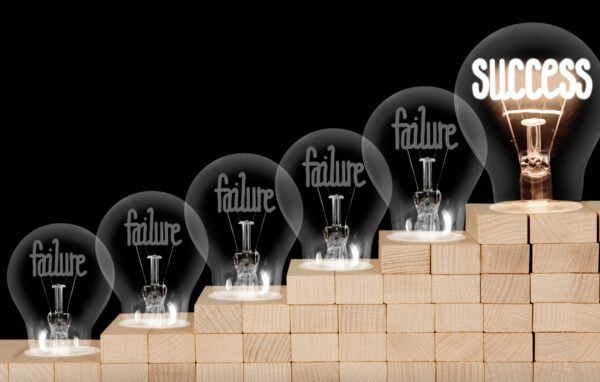Failure is inextricably tied to everyone’s story, yet it is often the portion we bury deepest, although it is the seedbed of our becoming.
Before I proceed, let me clarify that this article is not a perfunctory exhortation that failure is inherently virtuous or inevitable, although I could marshal a compelling argument for that claim. Rather, my central theme is that failure, when rightly engaged, becomes not an endpoint but the earliest draft of success.
The adverse relationship many of us have with failure persists largely because we were taught to view success as a fixed formula, one that can only be achieved through perseverance and repeated attempts. The problem with this rigid outlook is that it ignores the lessons that can only be learned through failure.
“Success is not a single breakthrough; it is the accumulation of many drafts of failure refined over time.”
Success is not a single breakthrough; it is the accumulation of many drafts of failure refined over time.
The real question, then, is not whether failure will arrive, but how we choose to prioritize it. By leaving failure unacknowledged, we allow it to define our outcomes rather than shape our growth. In other words, the timeless proverb still rings true: “If you fail to plan, you plan to fail.”

Today, planning must include failure itself, not as a threat to avoid, but as a partner in building resilience and success.
Most successful organizations understand this. That is why they establish systems of risk management, compliance, quality assurance, customer service and executive oversight to ensure that when failures occur, there are processes to absorb, adapt and recover quickly.
These teams are not simply damage control units; they are architects of resilience. They study breakdowns and identify root causes that strengthen the whole enterprise. Without these structures, failure becomes catastrophic; with them, it becomes catalytic.
“Top companies in dynamic markets thrive by embedding ‘fail-safe’ and ‘fail-forward’ mechanisms into their operations.”
Top companies in dynamic markets thrive by embedding “fail-safe” and “fail-forward” mechanisms into their operations. Tech firms, for instance, release beta products knowing they will encounter bugs, but by doing so, they gather insights that allow them to refine faster. Airlines and hospitals run drills and simulations, rehearsing failure so that when real crises strike, the response is almost second nature. What looks like disaster preparation is preparation for longevity.
Beyond technical systems, leading organizations also cultivate a culture of psychological safety that promotes an environment where employees are encouraged to experiment, take risks and even stumble without fear of retribution.
When failure is destigmatized, creativity flourishes. Teams feel comfortable bringing bold ideas forward, knowing that even if they falter, the organization will treat failure as information and not an indictment. In this way, companies that embrace failure are not just managing loss; they are multiplying potential.

When we give failure a priority in our planning, we create an environment where people are empowered to fail first. This doesn’t glorify mistakes; it normalizes them as part of progress.
Failing first inspires creativity and accelerates recovery. Ultimately, it is through a culture that welcomes failure that we discover the resilience to succeed.
History itself testifies to the power of failing first. Thomas Edison famously tested thousands of prototypes before inventing the light bulb, each failure illuminating a path toward success. The Wright brothers endured repeated crashes before achieving controlled flight, reshaping human mobility forever.
Even in modern times, companies like SpaceX have embraced explosive rocket failures as important rehearsals, learning from each setback until reusable spaceflight became reality. These examples remind us that what looks like collapse in the moment often becomes the foundation of unimaginable progress.
Failures, when embraced rather than avoided, drive growth at both personal and cultural levels. They clear the ground for new ways of thinking while simultaneously stripping away illusions of perfection.
Our greatest achievements as a society have rarely been the product of flawless execution; they have been born from brave people who failed first.
Rev. Joty T. Allison is a business development, fundraising strategist, and ordained clergy with more than 20 years of experience helping organizations grow through strategic partnerships, capital campaigns, and sustainable development planning. He can be reached at joty.allison@outlook.com.
JOTY ALLISON
Rev. Joty T. Allison is a business development, fundraising strategist, and ordained clergy with more than 20 years of experience helping organizations grow through strategic partnerships, capital campaigns, and sustainable development planning. He can be reached at joty.allison@outlook.com.







